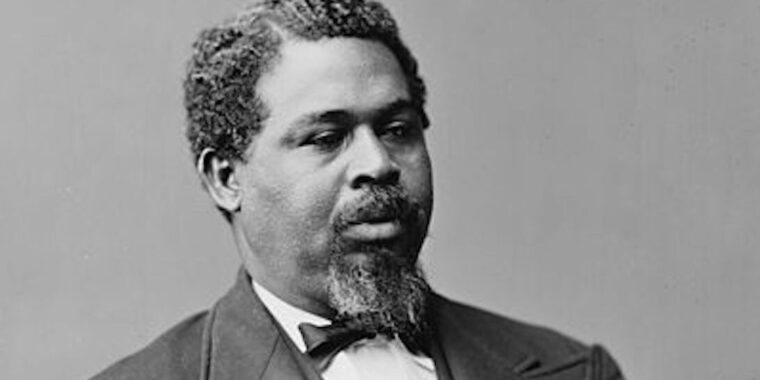
With the start of Black History Month, it is important that Americans come together to recount the legacies of the many black men and women who sacrificed and achieved so much in the societal struggle for equality in America. Instead of writing about the most well-known figures such as Dr. Martin Luther King, Rosa Parks, or Harriet Tubman, however, I would like to discuss a man that I feel is too often left out of such remembrances. Out of all the people from the American Civil War to talk about or glorify, I have seen, in my opinion, far too little of this man, who is probably one of the most deserving of it—a man who went from slave to congressman—and whose story is one of struggle and triumph. This is the story of Robert Smalls.
Robert Smalls was a slave in the city of Charleston, South Carolina at the outbreak of the American Civil War. There, he was rented out by his master to work on a ship, the CSS Planter, a gunboat that served as a transport vessel for the Confederate Army. He served as the Planter’s pilot, and in time, he managed to learn a great deal about Charleston Harbor. Soon enough, he would put that knowledge to use.
Under the cover of night, Smalls and several other slaves, including his wife and children, set forth to take the CSS Planter and escape. Smalls disguised himself as the ship’s captain, and successfully navigated his way through the various checkpoints until the ship had made it out of gun range. As the Planter left Charleston Harbor and approached the Union blockade, the slaves raised a white flag and were contacted by a Union ship. Smalls then surrendered his ship to them, and the escape was over. He and all those on board were finally free.
After his daring escape to the North, Smalls was hailed as a hero in the Union. However, this would only be the beginning of his involvement in the war effort, as he would directly petition President Lincoln and Secretary of War Edwin Stanton to allow for black men to fight in the Union Army. Later, Smalls would take command of the same vessel, now called the USS Planter that he had taken from the Confederacy. He joined the war on the front lines, becoming the first black man to command a US Navy ship, and was promoted to the rank of Captain for his valiance in action. At the end of the war, in April 1865, Smalls stood onboard the USS Planter in Charleston Harbor, returning as a free man.
In the years after the war, Robert Smalls returned to his hometown in South Carolina, and would go on to become a successful businessman and public figure. He founded the Republican Party of South Carolina, and was elected to the South Carolina House of Representatives in 1868. Six years later, he was elected to the United States House of Representatives. He invested heavily into his local community, and founded a railroad (Enterprise Railroad, perhaps the only black-owned railroad to exist) and a newspaper, the Beaufort Southern Standard. He lived a long and prosperous life, dying at the age of 75 in 1915.
A particularly interesting fact I learned about Smalls is that he was only 23 years old when he escaped with the CSS Planter, meaning he was only slightly older than most of us here at UVA in the modern day. He was not some old, grizzled, expert, but an intelligent, masterful young man, and to me, that is truly inspiring. Robert Smalls is a man who can be a role model for anyone. Going from a slave to a wealthy congressman, he was truly a self-made man. He seized his own freedom, and once he had it, he did not stop. Instead he sought to free everyone else left behind. We should all aspire to be more like him, to fight adversity head-on, to elevate ourselves and those around us, and to deal with issues in an intelligent and well-planned manner. Perhaps we all have the ability to be like him.
None of this is to say that the deeds of others who are spoken of more often today were not as important or heroic as those of Robert Smalls. Rather, I find it interesting that, important as he was, Smalls is hardly discussed in the modern day. Hell, he’s not even brought up by the Republican Party, and he was the man who founded the Republican Party of South Carolina. He was also the last Republican to represent South Carolina’s 5th congressional district until 2011, when Mick Mulvaney was elected. Personally, I see this as egregious— how a man who did so much has been honored so little, and how he is not known by most Americans today. The deeds of this one man are very much worthy of discussion and recognition, just as much as those of the most prominent American heroes, and I hope that one day more people will know of and be inspired by his courage and determination to pursue freedom and work toward bettering the country he loved.
I shall end this article with a quote from the man himself, first given by him to the South Carolina legislature in 1895 and later inscribed on an epitaph to him on a monument near his grave in his native Beaufort, South Carolina:
“My race needs no special defense, for the past history of them in this country proves them to be the equal of any people anywhere. All they need is an equal chance in the battle of life.”


Excellent article .As a high school teacher of African American History, he is one of my favorite people to instruct. I also managed to sneak him into the Cuvil War Unit.